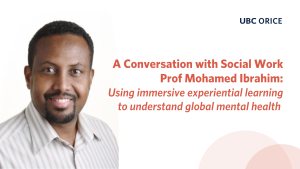

Dr. Mohamed Ibrahim Ph.D., MSW, RN is the instructor for SOWK 440J/571: Global Mental Health, an international course program offered by UBC’s School of Social Work in collaboration with the Office of Regional and International Community Engagement (ORICE). He is an assistant professor at UBC’s School of Social Work, with over 20 years working in East Africa, specifically in the Kenyan public health care system, and has extensive practice with mental health and addiction in the United States and Canada. Dr. Ibrahim brings a depth of experience, knowledge, and various connections that are key to what makes SOWK 440J/571 the valuable experience it is.
We asked Dr. Ibrahim about his personal reflections on creating and teaching SOWK 440J/571.
Based in Nairobi, Kenya, SOWK 440J/571: Global Mental Health is an immersive experiential learning opportunity that delves into global mental health within a non-western context. SOWK 440J/571 provides social work students with both theoretical knowledge and practical experiences that challenge them to think about mental health practice.
Q: Dr. Ibrahim, why did you decide to develop a course on global mental health in the School of Social Work at UBC?
When I was going through the interview process at UBC in 2018, I proposed developing a course on global health to be offered by the School of Social Work. A year after I joined the university, the Arts Research Abroad (ARA) Award, which aimed to provide financial support for international courses that included a research component, was announced. Determined to seize this opportunity, I applied for the grant and set out to design the global health course to be taught outside the UBC campus, in an international context. My goal was to design a course that would delve into the understanding of mental health on a global scale. I saw this as a way to align with UBC’s global engagement strategies and reach beneficiaries of the university worldwide. Instead of creating a course solely based on theory, my goal was to highlight how communities in the Global South address mental health and explore what we can learn from their approaches.
I reached out to Tamara Baldwin, Director, at ORICE and the Director of the School of Social Work at UBC, Dr. Miu Chung Yan, to bring this initiative to life. Fortunately, they were supportive and helped me in shaping the course. This was a perfect fit for me as my research revolves around global mental health, especially in East Africa. I believed that this course would provide an excellent knowledge experience for students as well. And as they say, the rest is history.
“Instead of creating a course solely based on theory, my goal was to highlight how communities in the Global South address mental health and explore what we can learn from their approaches.”
Q: Could you tell us more about your background working in the field of mental health and which unique knowledge you are bringing to create this course?
As mentioned earlier, I have had the privilege of working in the Kenyan mental health system for a significant period. Additionally, my global mental health experience spans 20 years, during which I have worked in various countries. While doing my master’s, I had the opportunity to enroll in a course similar to SOWK 440J/571 and travel to India to learn with graduate students at the Tata Institute of Social Science in Mumbai. It was really exciting to be taught by Professor Vikram Patel, who is widely recognized as a pioneer and leading figure in the global mental health field and is currently the head of the Blavatnik Institute’s Department of Global Health and Social Medicine at Harvard Medical School. Having worked extensively in Kenya, Somalia, the United States, and now in Canada, I consider myself a practitioner and educator in global mental health. This breadth of experience allows me to perceive the field from diverse perspectives.
Climate change and its impact on mental health have become significant topics of discussion worldwide, particularly in light of the COVID-19 pandemic. We frequently hear about the multiple factors contributing to the global humanitarian crisis and the urgent need to support those experiencing distress. However, it is essential to recognize that mental health is viewed differently across various cultures. For instance, Indigenous communities often approach distress through non-biomedical methods, relying on alternative approaches. Students can learn more about these approaches by taking the SOWK 440J/571 course.
While Canada is a multicultural country, its understanding of mental health is just one piece of the global puzzle. Therefore, enrolling in this course offers students from the School of Social Work and the Faculty of Arts, in general, a valuable opportunity to gain an understanding of how the mental health system operates beyond the confines of Vancouver. By exploring mental health perspectives from another part of the world, students can develop a more comprehensive understanding of the field.
“While Canada is a multicultural country, its understanding of mental health is just one piece of the global puzzle.”
Q: SOWK 440J/571 has a unique course structure where students have lectures in Kenya, followed by placements with local Kenyan community organizations that address mental health in their work. How different are student experiences in this course from the typical learning in the UBC setting?
As faculty members and students at UBC, we possess some knowledge about mental health services in the broader context of British Columbia and Canada. However, there is a noticeable lack of published research on the community work undertaken in the Global South. This knowledge gap is unfortunate because it limits our ability to understand how these communities incorporate local, Indigenous, and generational wisdom into their treatment and therapy plans.
During the development of SOWK 440J/571, I contacted my connections in Kenya, where I had previously worked in the mental health system before coming to BC. I proposed a partnership between UBC and community organizations there, giving UBC students a chance to gain hands-on experience by working with these organizations and attending lectures conducted by their staff members. In this way, the course goes beyond mere theory and provides practical knowledge on addressing social and health issues in resource-limited settings like Kenya.
While learning from textbooks is valuable, it lacks the element of active engagement. Direct interaction and learning from Kenyan communities have the potential to be game-changers for this course, as they offer a unique and transformative learning experience.
Q: What are some of your connections in Kenya that have been integrated into the course through the lectures, workshops, and other activities?
The course is supported by several partners who are actively engaged in Kenya and East Africa. One notable partner is the mental health advisor for an international NGO covering the entire African continent, Mr. Michael Njenga. He has played a significant role in addressing human rights issues within the mental health system and has made contributions to the United Nations Convention for the Rights of Persons with Disabilities. His extensive knowledge of the Kenyan and African context regarding the health struggles of the population makes him an invaluable collaborator for SOWK students.
Another community organization focuses on supporting refugees across Kenya, as the country hosts over 600,000 refugees. These organizations strive to provide psychosocial and economic support to refugees, as well as access to healthcare and education systems. They aim to generate innovative ideas to address the refugee crisis. For example, they collaborated with Canadian Immigration, Refugee and Citizenship and UNHCR (the UN Refugee Agency). Their partnership involves supporting trained health professionals from the refugee communities in Kenya for resettlement while addressing healthcare employee shortages in Canada. Such interconnectedness across the globe provides invaluable experiences for students aspiring to work as social workers.
Some of our students have had a chance to observe orientation sessions for refugees planning to resettle in Canada. By witnessing the beginning stages of this process during this orientation in Kenya, our students develop a deeper understanding of what the refugees go through before coming to Canada. Our intentional partnerships with organizations that employ innovative approaches ensure that SOWK students can learn from these unique practices applied in Kenya.
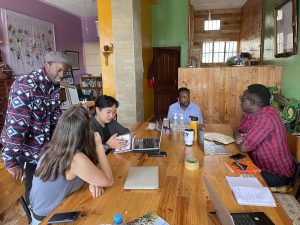

Student researchers placed in the Green String Network community organization working on the course project
Q: How is your teaching impacted by the unique structure of this international course?
As for my pedagogical philosophy, community engagement has been the cornerstone of my teaching, research, and academic pursuits. I strongly believe that the classroom extends far beyond its physical walls, encompassing the wider community. Whether I am teaching in BC or Kenya, my approach involves active collaboration with communities. They possess a deep understanding of their own needs and are often best equipped to address the challenges they face. As scholars, students, and learners, we must recognize the importance of learning from people.
Given that social work thrives on practical application and collaboration with communities, it is essential to provide learning experiences that foster connections with various organizations. Engaging and learning within a community environment teaches us the invaluable lesson of supporting and dedicating ourselves as professionals to those in need, regardless of whether they are in Kenya or Canada. Social workers must acknowledge that communities hold the solutions to their problems, and our role is to facilitate the implementation of these solutions effectively. I am confident that communities have the most insightful solutions to their challenges. They invite us to engage in research and work alongside them. It is my responsibility to emphasize the profound impact of the community in my teaching, areas of study, and academic discipline.
“Engaging and learning within a community environment teaches us the invaluable lesson of supporting and dedicating ourselves as professionals to those in need, regardless of whether they are in Kenya or Canada. Social workers must acknowledge that communities hold the solutions to their problems, and our role is to facilitate the implementation of these solutions effectively.”
Q: How do you hope the learning, experience and reflection that is built into SOWK 440J/571 impacts students’ overall understanding of social work practice?
Although it wasn’t until 2022 that we were able to have the course in person because of the COVID-19 pandemic, students are always seeking a global perspective, no matter in which format the course has been taught. As they transition from a high-income country like Canada to a low-income country like Kenya, they witness different approaches to addressing social issues. In the Canadian and BC context, we are well aware of challenges such as housing and homelessness, mental health and substance use crises. However, being a wealthy nation, we have ample resources to tackle these problems. Therefore, students need to step outside their resource-rich environment and observe how other communities address these issues with limited resources and various constraints. By witnessing how communities utilize scarce resources to sustain their existence, our SOWK 440J/571 students may develop a greater appreciation for what they have in Canada. They can also consider implementing certain cost-effective programs, based on their experiences working alongside community organizations in Kenya, that may prove more efficient for societal well-being.
I have to highlight the research component, which constitutes a significant portion of this course. Historically, knowledge exchange has predominantly flowed in one direction, originating from the Global North and disseminating to the rest of the world. Hence, one of the challenges students face is discovering the approaches and solutions that the Global South has to offer. Rather than serving as Western ambassadors in Kenya, SOWK students come with an open mindset, eager to learn alternative methods of addressing social issues. This shift in the knowledge exchange paradigm marks a meaningful departure from the centuries-long one-way flow of information.
“...students need to step outside their resource-rich environment and observe how other communities address these issues with limited resources and various constraints.”
Q: After having taught the course for the past four years, what are some of your highlights from teaching the course?
Despite the significant changes brought about by the COVID-19 pandemic, one aspect of the course has remained constant: the strong connection between academic learning and community engagement. This is a vital component that I am keen to preserve. I hope that there will be dedicated funding available to sustain this course as an international program, recognizing the importance of community-based learning. Our students are not simply attending a theoretical course; they are actively seeking knowledge from and engaging with the community.
Another noteworthy aspect is that over the past two years, the SOWK course has been a collaborative effort between UBC and the Kenyan Medical Training College (KMTC), the largest medical training institution in Kenya. Our students attend classes alongside future social workers, occupational therapists, public health specialists, nurses, and physician assistants from multiple campuses across Kenya. This unique partnership not only allows our students to contribute to community work but also enables them to learn alongside their Kenyan counterparts who are pursuing various medical professions.
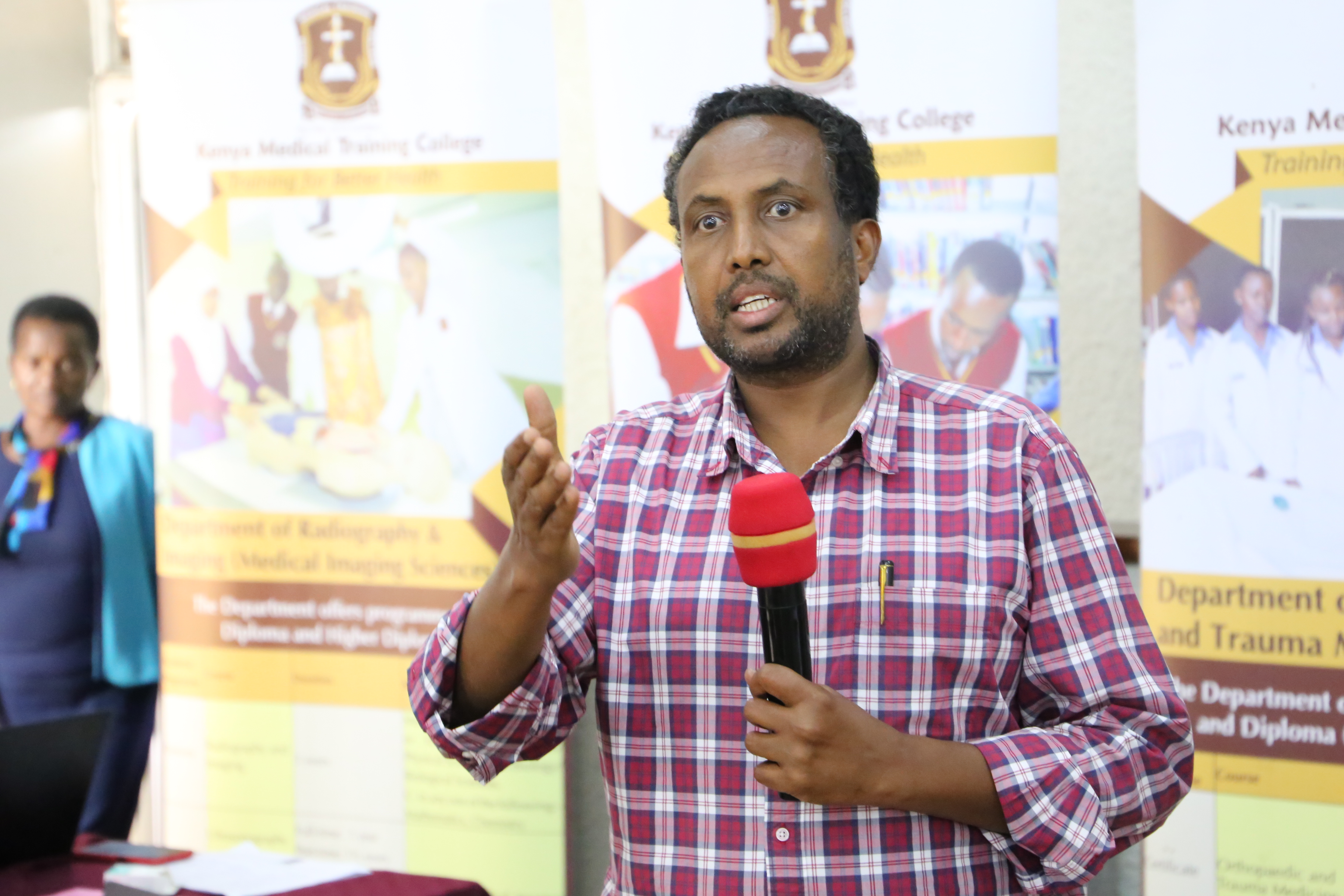
Dr. Ibrahim conducting a lecture during the joint program in Kenya Medical Training College
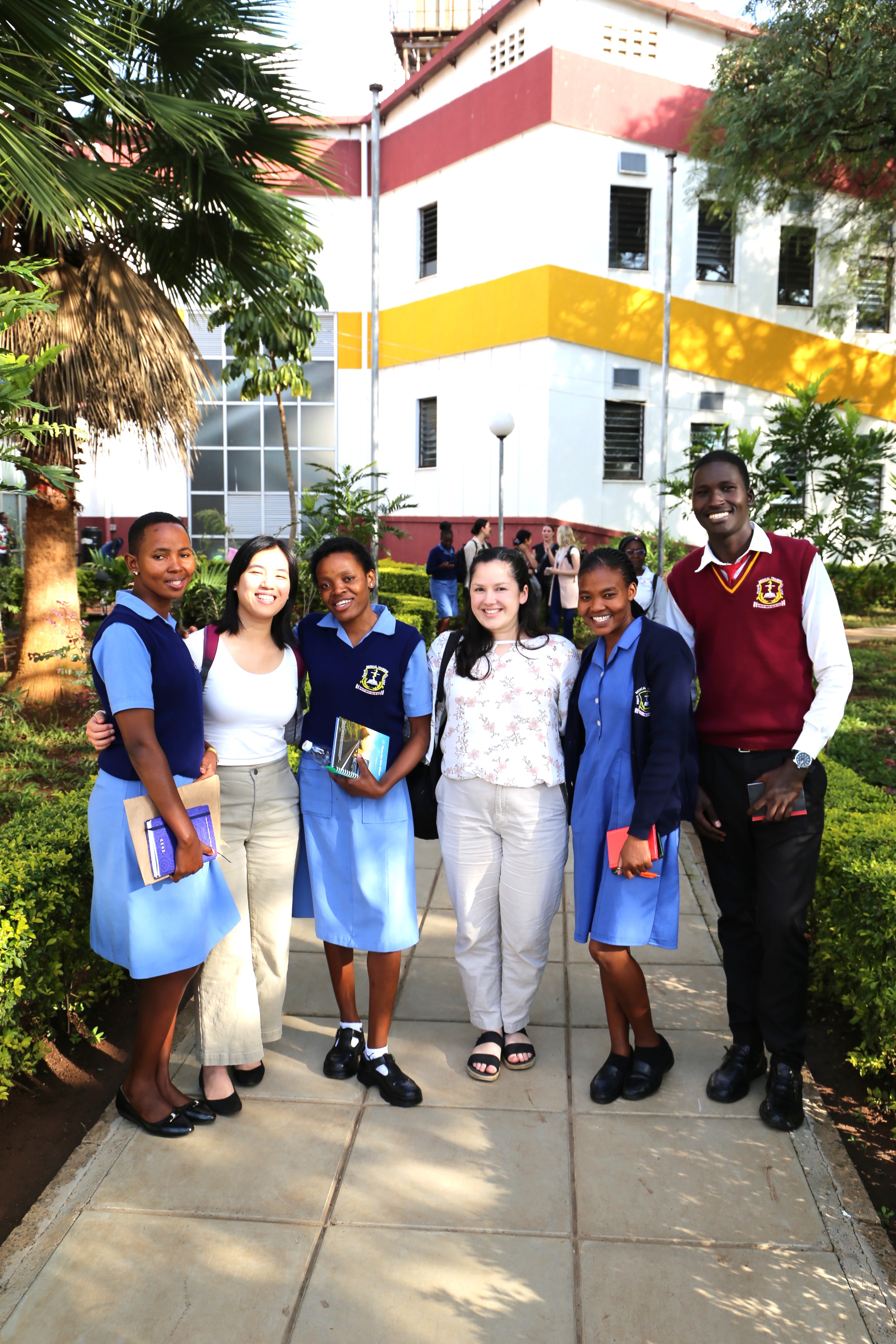
KMTC and UBC students during the networking time of the joint program with the Kenya Medical Training College
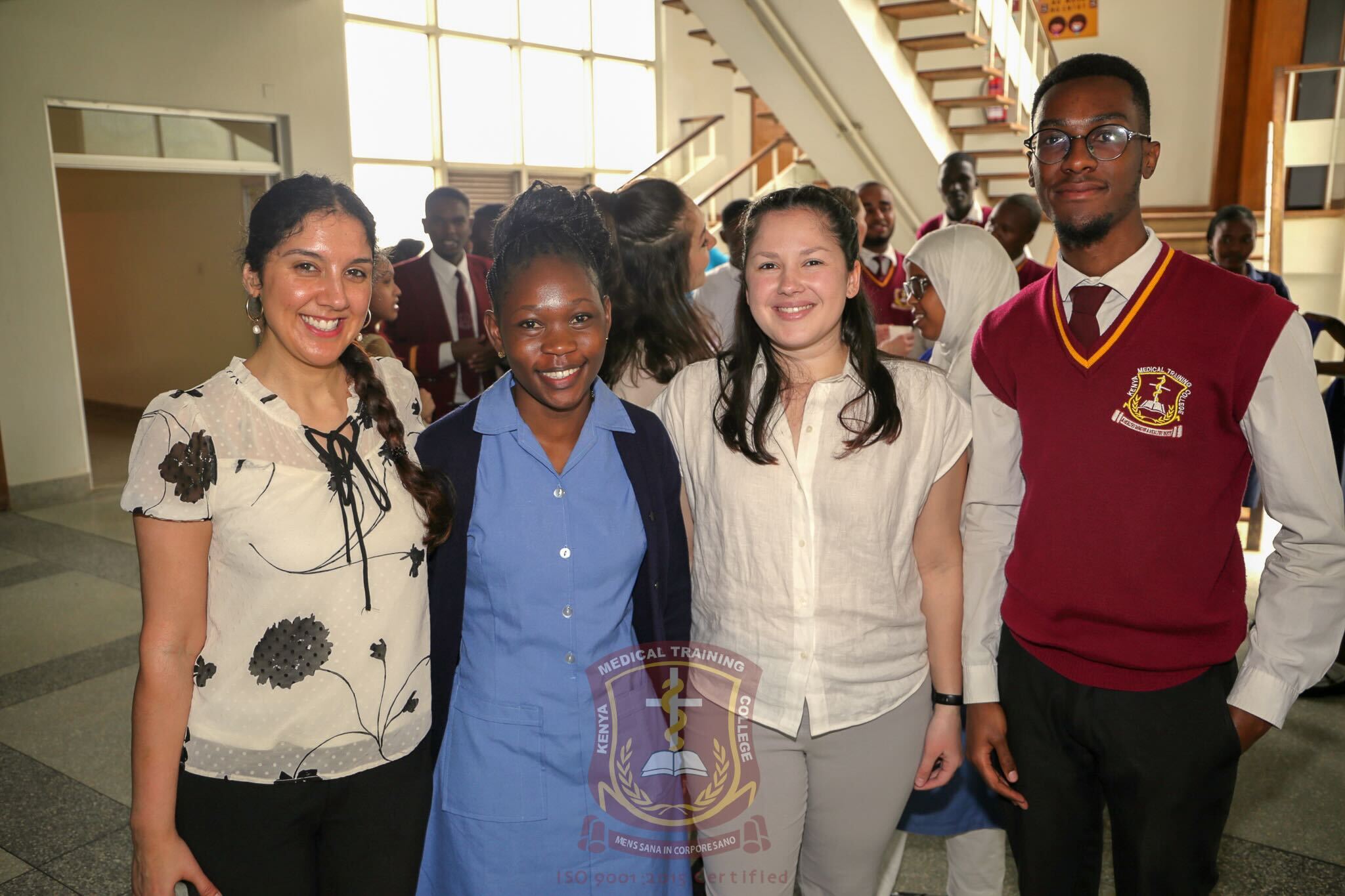
KMTC and UBC students during the networking time of the joint program with the Kenya Medical Training College
Q: What do you consider the next goal in the development of the SOWK 440J/570 course?
I cannot stress enough ensuring that the course is mutually beneficial for all parties involved. As part of UBC, we are fortunate to have funding that supports our students in travelling to Kenya. However, it is equally important to consider the opportunity for students from Kenya or Kenyan organizations to come to BC and experience what happens on our side. A two-way knowledge exchange is needed for the course to thrive and be sustainable truly. I hold the hope that in the future, we will secure funding that enables this idea to come to fruition. By fostering such reciprocal learning opportunities, we can create a more comprehensive and enriching academic experience for everyone involved.
I want to emphasize the significance of the partnership that exists between community organizations, the School of Social Work at UBC, and UBC ORICE. This collaboration has been a cornerstone in the success of the course. ORICE’s invaluable contributions, ranging from the selection process to the development of academic and travel logistics, have played a crucial role. We hope to continue nurturing and maintaining this partnership in the future, as it has been vital to the organization of the SOWK 440J/572 course.
—
Find out more about ORICE’s community and international course programs here
Applications for SOWK 440J/571 for the summer of 2024 are now open! Learn more and apply here. Learn more about one of ORICE’s global community partners Green String Network (GSN) by watching this video created in collaboration with SOWK 440J/571 students and the GSN. Also, check out this video for more about the joint lecture with Kenya Medical Training College.
About the Professor
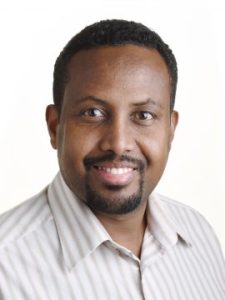

Dr. Mohamed Ibrahim Ph.D., MSW, RN
Dr. Mohamed Ibrahim is an assistant professor at the University of British Columbia School of Social Work.


